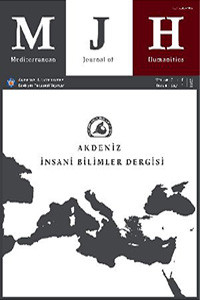Öz
Bu makale Marx‟ın meta fetişizmi analizinin Latourcu bir okumasını önermektedir. Metin, kendi eserleri üzerinden Latour‟un metodolojik pozisyonunu tanımlamak üzere dört nitelik belirlemektedir: bağlılık olarak gerçeklik; insan olan ile insan olmayanın ayrılmazlığı; aktantlara odaklanma; (karşı-) program olarak gerçeklik. Metinde, Latour‟un Pandora’nın Umudu (Pandora‟s Hope) eserinde Marx‟ın da dâhil olduğu ve put kırıcılar olarak adlandırdığı filozoflara ve tarihsel kişiliklere yönelttiği eleştiriler soru formunda Marx‟a yöneltilmektedir: (1) Meta fetişin karşılık geldiği şey bir hiçlikten mi ibarettir? Marx meta fetişi, emeğimizi yanlış bir şekilde yansıttığımız boş bir ekran olarak mı değerlendirir? (2) Emek gücü bütün yanılsamaları kırabilecek bir çekiç midir? (3) Marx fetişe safça inanan insanların olduğuna safça inanan bir put kırıcı mıdır? (4) Meta fetiş yanlış bir hedef midir? Makale Marx‟a yöneltilen bu soruları Latour‟un metodolojik pozisyonunu tanımlamak için belirlenen dört nitelik üzerinden cevaplandırmaya çalışmaktadır. Bu analiz bir yandan meta fetişin Latourcu bir çözümlemesini yaparken, Marx‟ın kendi meta fetişi analizinde hali hazırda var olan faktişist özellikleri açığa çıkarmayı hedeflemektedir.
Kaynakça
- Akrich M. & Latour B. (1997). “A Summary of a Convenient Vocabulary for the Semiotics of Human and Nonhuman Assemblies”. Eds. W. E. Bijker & J. Law, Shaping Technology/Building Society: Studies in Sociotechnical Change (1997) 259-264. Cambridge & London.
- Callon M. (1997). “Society in the Making: The Study of Technology as a Tool for Sociological Analysis”. Eds. W. E. Bijker, T. P. Hughes & T. Pinc, The Social Construction of Technological Systems (1997) 83-103. Cambridge.
- Danholt P. (2012). “Factish Relations: Affective Bodies in Diabetes Treatment”. Health 17/4 (2012) 1-16.
- Debord G. (1996). Gösteri Toplumu ve Yorumlar. İstanbul 1996.
- Dimoulis D. & Milios J. (2004). “Commodity Fetishism vs. Capital Fetishism: Marxist Interpretations vis-a-vis Marx‟s Analyses in Capital”. Historical Materialism 12/3 (2004) 3-42.
- Elder-Vass D. (2015). “Disassembling Actor-Network Theory”. Philosophy of the Social Sciences 45/1 (2015) 100-121.
- Flatschart E. (2012). “The Commodity and its Other”. Culture and Organization 18/5 (2012) 397-414.
- Holloway J. (2010). Change the World without Taking Power. London 2010.
- Hornborg A. (2014). “Technology as Fetish: Marx, Latour, and the Cultural Foundations of Capitalism”. Theory, Culture & Society 31/4 (2014) 119-140.
- Latour B. (1991). “Technology is Society Made Durable”. Ed. J. Law, A Sociology of Monsters: Essays on Power, Technology, & Domination (1991) 103-131. London & New York.
- Latour B. (1993). We Have Never Been Modern. Cambridge 1993.
- Latour B. (1994). “Pragmatogonies: A Mythical Account of How Humans and Nonhumans Swap Properties”. American Behavioural Scientist 37/6 (1994) 791-808.
- Latour B. (1997). “Where are the Missing Masses? The Sociology of a Few Mundane Artefacts”. Eds. W. E. Bijker & J. Law, Shaping Technology/Building Society: Studies in Sociotechnical Change (1997) 225-258. Cambridge.
- Latour B. (1999a). “Factures/fractures: From the Concept of Network to the Concept of Attachment”. Res: Anthropology and Aesthetics 36/Autumn (1999) 20-31.
- Latour B. (1999b). Pandora’s Hope: Essays on the Reality of Science Studies. Cambridge 1999.
- Latour B. (2003). Science in Action: How to Follow Scientists and Engineers through Society. Cambridge 2003.
- Latour B. (2004). “Why Has Critique Run out of Steam? From Matters of Fact to Matters of Concern”. Critical Inquiry 33/Winter (2004) 225-248.
- Latour B. (2007). Reassembling the Social. Oxford 2007.
- Latour B. (2010). On the Modern Cult of the Factish Gods. Durham 2010.
- Law J. (2007). “After ANT: Complexity, Naming and Topology”. Eds. J. Law & J. Hassard, Actor Network Theory and After (2007) 1-14. Malden, US.
- Luke T. W. (2000). “Cyborg Enchantments: Commodity Fetishism and Human/Machine Interactions”. Strategies 13/1 (2000) 39-62.
- Marx K. & Engels F. (1992). Alman İdeolojisi [Feurbach]. Ankara 1992.
- Marx K. & Engels F. (2010). “Komünist Manifesto”. Komünist Manifesto ve Hakkında Yazılar, (2010) 19-51. İstanbul.
- Marx K. (1978). Kapital. Birinci Cilt. Ankara 1978
Ayrıntılar
| Birincil Dil | Türkçe |
|---|---|
| Konular | Sosyoloji (Diğer) |
| Bölüm | Araştırma Makaleleri |
| Yazarlar | |
| Yayımlanma Tarihi | 30 Aralık 2017 |
| Yayımlandığı Sayı | Yıl 2017 Cilt: 7 Sayı: 2 |
| Adres: Akdeniz İnsani Bilimler Dergisi Akdeniz Üniversitesi, Edebiyat Fakültesi 07058 Kampüs, Antalya / TÜRKİYE | E-Posta: mjh@akdeniz.edu.tr |


